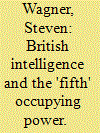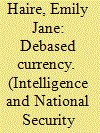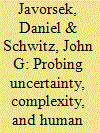|
|
|
Sort Order |
|
|
|
Items / Page
|
|
|
|
|
|
|
| Srl | Item |
| 1 |
ID:
133418


|
|
|
|
|
| Publication |
2014.
|
| Summary/Abstract |
At the end of the Second World War, British intelligence struggled to enforce strict limits imposed on Jewish immigration to Palestine. Holocaust survivors and Jews wishing to escape communism in Eastern Europe flooded the western Zones of occupation in Germany and Austria, while the Zionist movement worked to bring them to Palestine. Illegal immigration to Palestine was the key policy dispute between Britain and the Zionist movement, and a focus for British intelligence. Britain sought both overt and covert means to prevent the boarding of ships at European ports which were destined for Palestine, and even to prevent the entry of Jewish refugees into the American zones. This article highlights Britain's secret intelligence-gathering efforts as well as its covert action aimed to prevent this movement. It highlights a peculiar episode in the 'special relationship' between Britain and the United States, during which cooperation and partnership was lacking. British intelligence promoted a rumour that Soviet agents were using Jewish escape lines to penetrate Western Europe and the Middle East in order to persuade American authorities to prevent the movement of Jewish refugees. Instead, this article argues, American intelligence secretly cooperated with the Zionist organizers of the escape routes so to expose Soviet agents. Britain's attempt at deception backfired, and provided effective cover for the movement of hundreds of thousands of Jews during a critical period. Meanwhile its intelligence had dramatically improved, but policymakers failed to reassess Britain's ability to sustain immigration restrictions and the indefinite detention of tens of thousands of illegal migrants.
|
|
|
|
|
|
|
|
|
|
|
|
|
|
|
|
| 2 |
ID:
133420


|
|
|
|
|
| Publication |
2014.
|
| Summary/Abstract |
Using memoirs can be a vital way of supplementing archival evidence or indeed of overcoming a shortage of contemporaneous sources, and they offer insights into the attitudes and motivations of participants as well as how they recorded and remembered events. Memoirs retain an inherent value that must not be ignored, particularly in the study of intelligence liaison which addresses the kinds of personal and cultural aspects which are often especially well illuminated through autobiographical writing. This paper explores some of the theoretical and practical issues associated with the use of memoir material and examines them through the prism of selected autobiographical writings related to Anglo-French intelligence liaison from the Great War up to the Second World War.
|
|
|
|
|
|
|
|
|
|
|
|
|
|
|
|
| 3 |
ID:
133419


|
|
|
|
|
| Publication |
2014.
|
| Summary/Abstract |
During the Second World War there was an increasingly developed system for controlling the code-names used for operations where different Allied forces were involved. This paper follows the development of this system - based on the British Inter-Services Security Board - that spread to overseas theatres on the British side and to American forces world-wide. The selection of code-names was not without controversy; with Winston Churchill getting personally involved and his intervention is highlighted. A critique of the system is attempted, although the final judge is ultimately the success of the security of the activities disguised by the code-names.
|
|
|
|
|
|
|
|
|
|
|
|
|
|
|
|
| 4 |
ID:
133416


|
|
|
|
|
| Publication |
2014.
|
| Summary/Abstract |
The US intelligence community prepares occasional psychological profiles of foreign political leaders. The origins of these practices lie in frantic and ad hoc attempts to understand the character of Adolf Hitler during the latter stages of the Second World War. The US Office of Strategic Services (OSS) commissioned profiles of Hitler, contracting with a titan of personality theory in Professor Henry A. Murray and practicing psychoanalyst Walter C. Langer. Reconstructing the history of these profiles grounds the contemporary analysis of foreign leaders in the lessons of the pioneers. Useful insights on the challenges of profiling leaders, the relationship of academic theories - and academic personnel - to government, and the role of intelligence in policy abound.
|
|
|
|
|
|
|
|
|
|
|
|
|
|
|
|
| 5 |
ID:
133415


|
|
|
|
|
| Publication |
2014.
|
| Summary/Abstract |
Geopolitical dynamics associated with nuclear proliferation, the Arab Spring, the rapid rise of Chinese power, an oil-fueled Russian resurgence, and the post-Afghan and Iraq eras will demand significant changes in intelligence focus, processes, and resources. Nearly a decade after intelligence failures required a restructuring of the Intelligence Community with mandates for a scientific approach to intelligence analysis, current efforts continue to focus on overly deterministic individual analyst methods. We argue for a process-oriented approach to analysis resembling the collaborative scientific process successful in other professions that is built on shared theory and models. After demonstrating that events in the real world are path dependent and contingent on deterministic and random elements, we highlight the role of uncertainty in intelligence analysis with specific emphasis on intelligence failures. We then describe how human agency in an interconnected and interdependent system leads to a landscape of dancing strategies as agents dynamically modify their responses to events. Unfortunately, the consequences of the present deterministic intelligence mindset are significant time delays in adjusting to emerging adversaries leading to an increased susceptibility to intelligence failures. In contrast with the existing analyst-centric methods, we propose a risk management approach enhanced by outside collaboration on theory and models that embrace lessons from the twentieth-century science of uncertainty, human agency, and complexity.
|
|
|
|
|
|
|
|
|
|
|
|
|
|
|
|
| 6 |
ID:
133417


|
|
|
|
|
| Publication |
2014.
|
| Summary/Abstract |
In 1966, in what has become known as the Wilson Doctrine, the Prime Minister, Harold Wilson, informed Parliament that he had issued an instruction that the telephones of parliamentarians were not to be intercepted by the intelligence and security agencies. Subsequent Prime Ministers have all expressed their continued commitment to the Wilson Doctrine. This article examines the nature and limitations of the Wilson Doctrine, and its continued application in the context of recent legislative changes and a number of prominent recent cases. It focuses on apparent changes to the scope and attempts to set aside the Wilson Doctrine under the Blair government and the implications of the interception of the communications of Sinn Fein Members of Parliament, and the bugging of meetings involving the Labour MP Sadiq Khan.
|
|
|
|
|
|
|
|
|
|
|
|
|
|
|
|
|
|
|
|
|